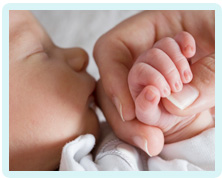
Incontinence Issues After Birth
Childbirth can lead to long-term incontinence issues, including urinary incontinence, faecal incontinence and incontinence of flatus (wind).
Urinary incontinence after childbirth
Urinary incontinence after birth is usually caused by damage to the pelvic floor. The pelvic floor muscles stretch from the front to the back of the pelvis. They act as a sling, supporting the pelvic organs such as the bladder, uterus and bowel. The process of giving birth to a baby vaginally stretches these muscles and can also damage the nearby nerves, including the pudendal nerve.
These injuries can have an adverse impact upon someone's ability to prevent the passing of urine. It may be that urine seeps out when stress is placed on the bladder, which can happen when sneezing or laughing. It can also be difficult to hold on to urine when the need to void arises. These problems can often be improved through regular pelvic floor exercises.
Faecal incontinence after childbirth
Faecal incontinence after childbirth is usually caused by damage to the anal sphincter complex. The anal sphincter complex is a group of muscles that control the passing of wind and faeces. This enables us to defer defecation until a convenient time. The anal sphincter can be injured during a vaginal delivery, as it is possible to sustain a perineal tear that extends through the perineum and into the anal sphincter muscles.
Obstetric anal sphincter injury can reduce the function of the muscles, making it hard to hold on to faeces – particularly if the stool is loose. Consequently someone may find that she has just minutes to reach a toilet or no warning whatsoever. There are various treatments that can help to improve such symptoms, including sacral nerve stimulation and biofeedback.
Flatus incontinence after childbirth
Flatus is the medical term for wind. Like faecal incontinence, incontinence of flatus is caused by damage to the anal sphincter muscles. Treating this form of incontinence can be difficult, especially if a fourth degree tear has been sustained.
Are my injuries negligent?
The injuries such as those described above are potential risks of a vaginal delivery. If you received an acceptable standard of care but you have been left with long-term problems, there will not be grounds for a claim as you have not been the victim of negligence.
But if your incontinence issues have arisen as a result of poor care, you will be legally entitled to pursue a claim for compensation. One example might be that your tear was not diagnosed and repaired, meaning a defect was left in your anal sphincter, causing you to develop incontinence.
For more information on claiming compensation, please get in touch with us at Glynns Solicitors.
Please call us on 0800 234 3300 (or from a mobile 01275 334030) or complete our Online Enquiry Form.



